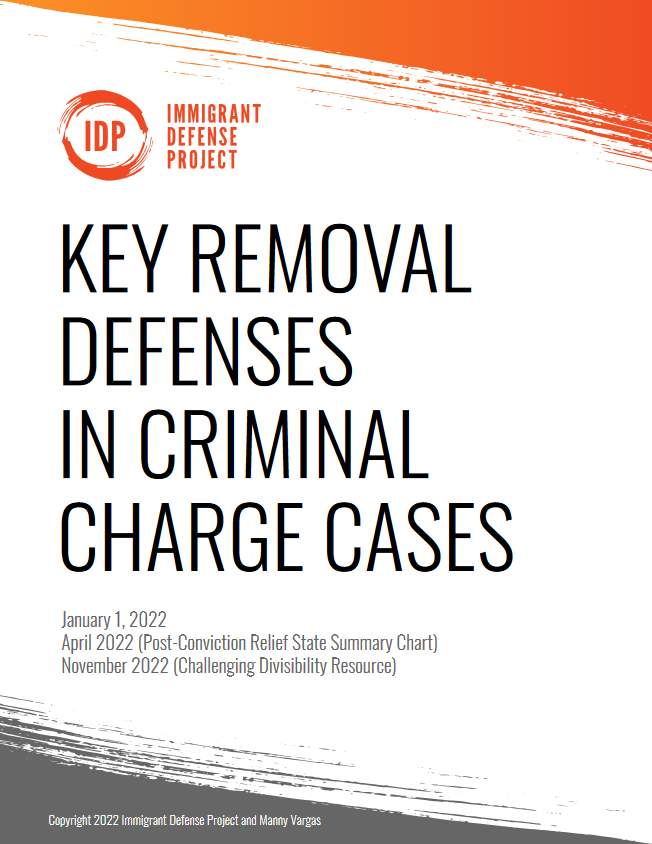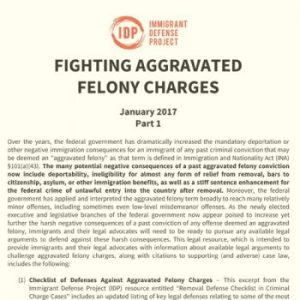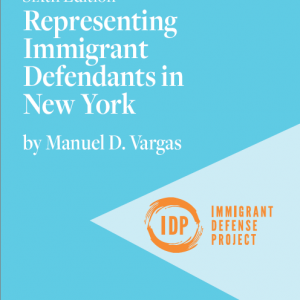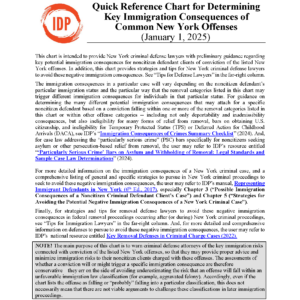Key Removal Defenses in Criminal Charge Cases
Key Removal Defenses in Criminal Charge Cases and the Domestic Offense Supplement equip noncitizens and their legal representatives with tools to fight against deportations based on the U.S.’s unjust and racially biased criminal legal system. These resources summarize key legal defenses and strategies in cases alleging removability or ineligibility for relief based on common crime-related charges. Criminal-immigration law is a complex and evolving field but this resource makes cutting-edge strategies for using the courts to resist mass imprisonment and deportation more accessible to nonprofit legal service providers, private practitioners, law school clinics, and other advocates.
Description
Key Removal Defenses in Criminal Charge Cases and the Domestic Offense Supplement equip noncitizens and their legal representatives with tools to fight against deportations based on the U.S.’s unjust and racially biased criminal legal system. These resources summarize key legal defenses and strategies in cases alleging removability or ineligibility for relief based on common crime-related charges. Key Removal Defenses in Criminal Charge Cases includes strategies for defending against a wide range of charges, including:
- crimes involving moral turpitude,
- controlled substance and illicit drug trafficking aggravated felony offenses,
- firearms offenses and explosive materials or firearms aggravated felony offenses, and
- selected aggravated felony categories (including “rape,” “sex abuse of a minor,” “crime of violence,” “theft,” “burlary,” “fraud or deceit,” “prostitution business,” and “obstruction of justice” categories).
The main text of the resource was last updated on January 1, 2022 and it includes information about post-conviction relief updated April 2022 and divisibility updated November 2022.
The Domestic Offense Charges Supplement, included with Key Removal Defenses in Criminal Charge Cases, covers strategies for defending against removability charges based on a “crime of domestic violence,” “crime of stalking,” “crime against a child,” and “violation of protection order” grounds. The text of this supplement was last updated on September 1, 2022.
You can preview the table of contents for Key Removal Defenses in Criminal Charge Cases and for the Domestic Charges Supplement to gain a better understanding of the breadth of removal grounds and strategies addressed. While the resources do not cover every criminal ground, they are designed as a starting point for research. Criminal-immigration law is a complex and evolving field but this resource makes cutting-edge strategies for using the courts to resist mass imprisonment and deportation more accessible to nonprofit legal service providers, private practitioners, law school clinics, and other advocates.
These resources are available in print while supplies last. Orders of the physical copy of the resource will include color copies of the Key Removal Defenses in Criminal Charge Cases and the Domestic Offense Supplement in a binder which can continue to be used for forthcoming supplemental materials. The resources are also available for electronic download as PDFs, subject to IDP’s electronic download agreement.
You can support IDP’s work by buying this resource, subscribing to our newsletter for more information about our legal resources and other work, or considering making a small, tax-deductible donation.
Table of Contents
IDP’s new resource, Key Removal Defenses in Criminal Charge Cases, includes essential arguments for clients charged with removability based on criminal legal system contacts. Check out the full Table of Contents to see the range of arguments and grounds covered. This resource will jump start your research into defenses for clients with criminal convictions.
Defenses based on the definition of “crime involving moral turpitude”
IDP’s new resource, Key Removal Defenses in Criminal Charge Cases, includes essential arguments for clients charged with removability based on criminal legal system contacts. See a sneak peek at the defenses for alleged “Crimes Involving Moral Turpitude” (CIMT) with supporting case law for arguments for using a strict categorical approach analysis, minimum mens rea standards, and they type of conduct that can qualify as “vile and depraved.”
Defenses to allegation that a conviction is a CIMT because it involved perjury, false statement, or other alleged fraud
The Key Removal Defenses in Criminal Charge Cases resource helps attorneys identify the boundaries of the definition of a CIMT based on a perjury, false statement, or other alleged fraud offense so they can argue their client’s conviction is not a CIMT. It can answer questions such as, when is a state perjury conviction a CIMT? Are defenses available if my client was convicted of an offense involving false statements to government officials or possessing an altered immigration document? Is a conviction for using a false social security number always a CIMT? Depending on the client’s situation, success on these arguments can result in termination of removal proceedings or eligibility for relief from deportation.
For purchasers purchasing a digital download of an electronic copy of Key Removal Defenses in Criminal Charge Cases and the Domestic Offense Supplement, upon processing your payment, you will be prompted to download this digital resource.
By purchasing an electronic download, you are:
- Agreeing not to distribute, reproduce, or otherwise provide or allow access to the resource to anyone, with the exception of individuals employed by your firm or organization.
- Agreeing that you may provide temporary use of the resource to interns or volunteers during the time they are engaged by your organization or firm for the purpose of their work on behalf of your organization or firm.
- Agreeing to notify the Immigrant Defense Project immediately if you learn that an unauthorized person or entity has accessed the resource using your account or any other information provided by or obtained from you or anyone at your organization.
- Confirming that neither you nor any employee or member of your organization is involved in the prosecution or deportation of individuals or associated with any local, state or federal prosecution or enforcement agency.




